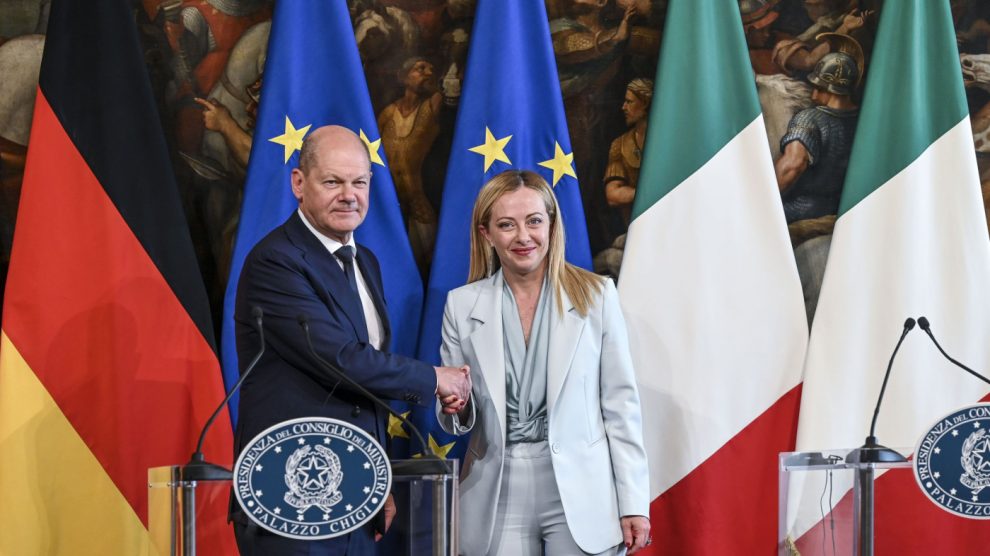Giorgia Meloni and Olaf Scholz touch base. On Thursday, the Italian Prime Minister welcomed the German Chancellor in Rome for an official State visit. Their talks encompassed bilateral dialogues, migration, shared strategic interests, European rules and the upcoming Action Plan between Italy and Germany to consolidate the ties between the two.
- Mr Scholz sought to reassert their support for Ukraine, “which we support politically, financially, [at the humanitarian level] and with weapons, with military training” for “as long as it is necessary.” He also highlighted how “encouraging” and “positive” the European joint response to Russia’s full-scale invasion of Ukraine was.
- “All people who have a responsibility understand how defending the sovereignty, the freedom of the Ukrainians is a fundamental condition for also defending the freedom, the sovereignty, the stability of Europe,” stressed Ms Meloni.
Towards the Action Plan: PM Meloni announced that she and Chancellor Scholz had “substantially reached an understanding” on the final version of the document, to be officially signed by year’s end at an intergovernmental summit in Germany. As she said in front of the press, the Action Plan could foster both Italo-German relations and the countries’ coordination in the European and international spheres.
- “The complementarity between our economic systems emerges not only from the size of the interchange – over €168 billion in 2022, an absolute record level for Italy – but also from the growth in flows, which have increased by €50 billion in three years,” she noted.
A structural cooperation mechanism. As revealed by Corriere della Sera, the Action Plan (and the accompanying Declaration of Intent) envisage five strategic areas of collaboration: growth, competitiveness and employment; foreign and security policy; the green agenda and climate protection; Europe and the rule of law; and culture and civil society.
- In addition, the countries will set up a 2+2 meeting format between the foreign and defence ministers, a bilateral macroeconomic forum between the finance ministers and an institutional dialogue on migration between the interior ministries.
What is it, really? In terms of quality, the Action Plan stands somewhere in between the Italo-French Quirinal Treaty and the recently-signed Memorandum of Understanding between Rome and London. But it is worth remembering that, as the ups and downs between Italy and France have shown, the implementation of this sort of agreement is strictly linked to the political climate.
- Still, by reinforcing cooperation in strategic sectors between Rome and Berlin, the Action Pact would effectively bring to life a novel France-Germany-Italy framework – complementing the historical Franco-German engine with the Italian political and productive prowess.
Focus on: migration. That was one of the critical dossiers on the leaders’ table, especially as European countries discuss reforming the EU’s migration system. And there was room for disagreement, with the German Chancellor warning that “offloading the problems onto others is an attempt doomed to fail.” Still, he had also acknowledged that Italy cannot be left alone in dealing with the arrivals.
- On her part, the Italian leader said she was convinced that “arriving at a [EU-wide] solution is a priority” and stressed the importance of paying attention to the countries under the most pressure. The two agreed on the need for a “fruitful dialogue.”
- PM Meloni also spoke of a certain harmony in Tunisia, a dossier on which she preaches the need for pragmatism, including in this coming Sunday’s mission to Tunis with EU Commission President Ursula von der Leyen and Dutch PM Mark Rutte.
Focus on: fiscal reforms. The two leaders underscored they both agreed that the old EU Fiscal Pact is “outdated” and that “the new [rules] must take into account the competitiveness of our systems.” Specifically, PM Meloni emphasised the urgency of a new Pact centred on support and growth “because European competitiveness needs to be supported by vision and appropriate rules” – which warrant fiscal rules “that ensure flexibility.”
- The Chancellor’s detachment from Germany’s traditional line of fiscal rigorousness exemplifies the extent of the challenges to keep European economies competitive in the face of the digital and twin transition – and fierce foreign competition.





